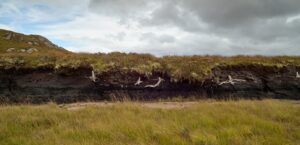De- and Re-forestation

As I am walking in the nature of Scotland this winter with its crisp days and cold winds I cannot help wondering where the forests have gone. So few trees, so much open land and the brown tufts of bracken everywhere. They must have been there – in places one can still see the roots of the ancient forests under the peat. So, I had to read it up!
I discovered that the woodland cover of Scotland declined much earlier than we think. Due to early agriculture and other human activity, it was replaced by peatland and resulted in a massive loss of biodiversity. By the time the Roman legions of Agricola arrived in Scotland in AD 82, at least half of the natural woodland was gone. By 1900 only 5% of the woodland was left – and that only as small and isolated patches. This led to the loss of animal species that require larger, unbroken blocks of native woodland – especially larger mammals and predators – as Scotland’s Nature Agency tells us.[1]
The deforestation that had begun long before our time, both on the mainland and the islands of Scotland, was dramatically accelerated from the 17th century onwards; by land clearances, by agricultural and industrial revolutions and by the development of large shooting estates in the Highlands, all driven by maximising profit. Too many cows and sheep, overpopulation of deer, and in many places almost no wild nature left. The only source of drinking water on one of the islands I know so very well is no longer fit for use.
But there is hope! Today, there are wonderful reforestation projects already at work. Forests are the lungs of our planet, each precious tree, each little plant produces the oxygen we breathe and consumes the CO2 we emit. We need them – we need them to be able to live.
We can find new harmony with the creation if we are willing to listen to the groaning of the world. We need to stop the destruction by reducing emissions, by considering the environment in every decision that we make, and by planting trees again.
Proverbs 1:20-23
Wisdom cries out in the street; in the squares she raises her voice. At the busiest corner she cries out; at the entrance of the city gates she speaks
In Jewish tradition (and in many Christian ones too) Wisdom, She who cries out in the streets for us to hear, is one of the images, one of the attempts to describe the nature of God. It tells us about a loving God who cares deeply about the whole of the wonderful, diverse, rich creation – including us. We are not above it, not meant to subdue and exploit it as it has been done for a very long time. Instead we are part of it, intertwined, one thread of the fragile mesh of life.
Let us listen to Wisdom, listen to God! Let us change our ways and live, have a life and a future for our planet, for our beautiful fellow creatures and for our children. Let us make wise, informed choices in our everyday lives, let us raise awareness and work to change the destructive systems and mechanisms in our societies.
Prayer
Source of all life
God of the lush forests
God of the clean air
God of the clear waters
God of every living creature
Open our eyes, minds and hearts
To see that we are all connected, all part of the same network of life
What hurts and pollutes one, hurts and pollutes the other
Help us to listen to you and to repent form our destructive ways
So that your wonderful, diverse planet can breathe again and live
And we and our children with it. Amen
For more visit: https://www.ionabooks.com/product/living-faithfully-in-the-time-of-creation/
[1] https://www.nature.scot/professional-advice/land-and-sea-management/managing-land/forests-and-woodlands/history-scotlands-woodlands#:~:text=By%20the%20time%20the%20Roman,partly%20because%20of%20human%20activities.




Peatland also has a special value as a habitat and carbon sink. Plant trees, yes, but the right trees in the right place, which means not on peatland